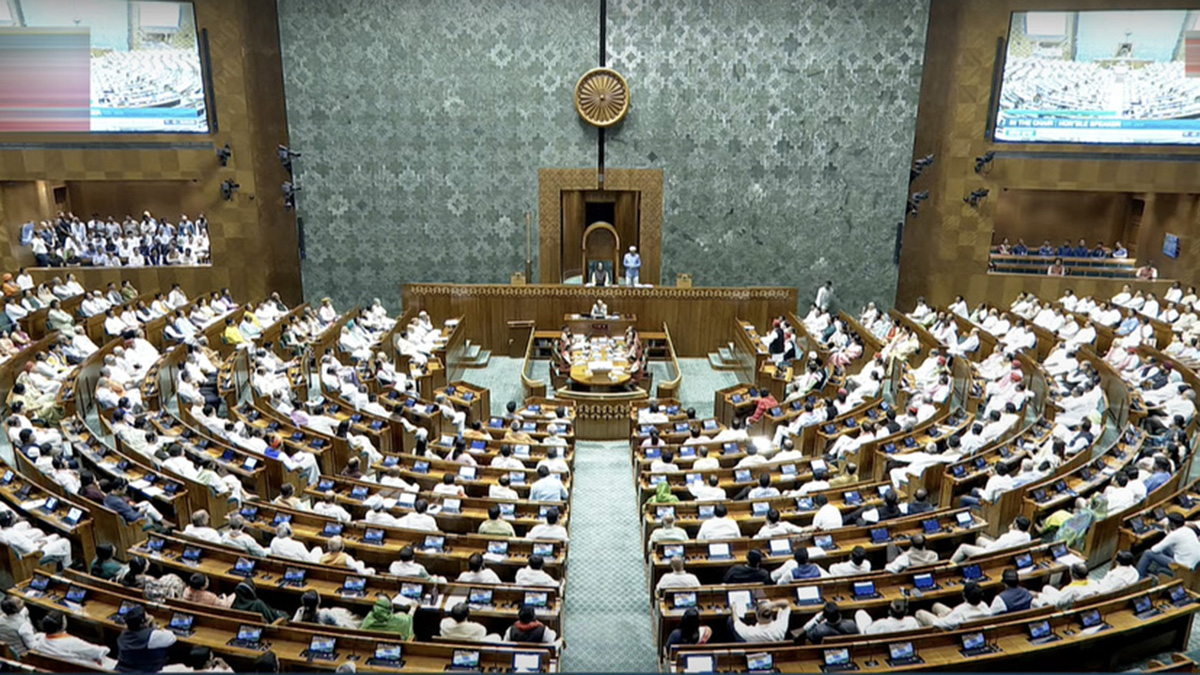This Parliament session is interesting for several reasons. For the first time in a decade, the BJP will not be in an absolute majority. The government will be a coalition, where key allies like the TDP and the JD(U) will have to be taken on board on major decisions. There will also be a much stronger—and confident—Opposition voice. Parliament will be fractious, confrontational, and divided. But there is one thing that seems to be in the hands and minds of all sides: The Indian Constitution.
The INDI Alliance members had a copy of the Constitution when they took their oath as members of Parliament. The BJP too pledged its complete fidelity to the Samvidhan. At the crux of this surprising conflation is the vital issue of the preservation of democracy. The Opposition accuses the BJP of subverting it in the form of an ‘undeclared Emergency’, and the BJP is quick to recall the formal Emergency declared by Indira Gandhi in 1975, and the less than perfect democratic record of the decades of Congress rule.
In the midst of this endless mudslinging, that occupies much of prime time on TV, are several important lessons. The Constitution is just a piece of paper, until it is infused with the spirit of parliamentary democracy that is emphatically underlined in its basic structure and intent. What this means in real terms is the freedom of speech and expression, the right to dissent, an independent judiciary, a free media, the right to profess and propagate one’s own faith in a multi-religious nation, equality of status and opportunity, and the sanctity of institutions that are intended to be autonomous and free of political interference. Equally, the real spirit of the Constitution validates a system of checks and balances, and while creating provisions for dealing with extraordinary situations, explicitly prohibits their misuse. It invalidates, except in highly limited and narrowly defined situations, which are rare exceptions and not the rule, the use of draconian laws that militate against individual liberty and justice. And finally, the spirit of the Constitution assumes an express level of ethicality in democratically elected governments, where the rampant use of money and muscle power is sacrilege.
By these yardsticks, which are non-negotiable, the performance of the world’s largest democracy has been, to put it mildly, less than perfect. The irony is that the provisions of the Constitution have themselves been used to subvert democracy. The Emergency in 1975 was declared by invoking a provision in the Constitution. Draconian laws have been passed by using as routine specifically defined exceptional circumstances in the book. The right to dissent and freedom of speech and expression have been smeared with the ink of legality by misusing well-intended provisions of our democratic primer. Money power, to topple elected governments, the invention of ‘resort politics’, and the unlimited use of unaccountable money in fighting elections have all happened under the awning of the Constitution. The autonomy of investigative agencies and the Election Commissions have been compromised while every political party swore allegiance to the Samvidhan.
Impact Shorts
More ShortsThe early decades of Congress rule saw the initiation of many of these transgressions. Article 356 of the Constitution was misused on innumerable occasions to remove duly elected governments. And, the ultimate violation of the spirit of democracy took place when the Emergency was declared. The BJP is right when it says that the last party to give sermons on the Constitution is the Congress.
But because these violations were committed in the past by a rival party, does it justify similar misuse by the BJP-NDA governments? Does one wrong make another right? How long can the past be resurrected to deflect attention from current and continuing aberrations? Has not the BJP, in the last 10 years, compromised the functioning of independent institutions? Were the provisions of the draconian UAPA and PMLA Acts not further strengthened under the BJP government, reversing the presumption of innocence and institutionalising the denial of bail which is a legal right? Was the transparent vendetta politics against the Opposition in the democratic spirit of the Constitution? Did action against dissent not increase under its rule? Was respect for all faiths, guaranteed under the Constitution, not violated? Were democratically elected governments not toppled or divided by the repeated use of money power and the threat of punitive action by so-called independent investigative agencies? Was the freedom of the media and the press not browbeaten into compliance — leading to the widely used expression ‘godi media’ — by the threat of misuse of power?
Moreover, are Opposition-ruled states acceptably democratic in their own turf? The truth is best summed up in a common Hindi phrase: Is hammam mein sab nange hain, the import of which is that no one is really unblemished in this unconstitutional game. When those who swear by democracy acquire power, they are all prone to Lord Acton’s immortal words: ‘Power corrupts. And absolute power corrupts absolutely’.
What is most unfortunate is that in this murky game, no lessons are learnt, and no genuine reform takes place. Above all, as the endless acrimony continues on the sterile issue of who is more constitutionally holy than the other, good governance and the interests of the common person continue to be neglected.
The author is a former diplomat, an author and a politician. Views expressed in the above piece are personal and solely those of the author. They do not necessarily reflect Firstpost’s views.
)